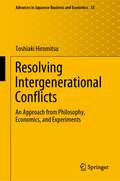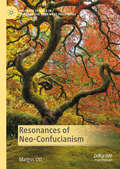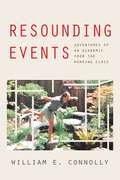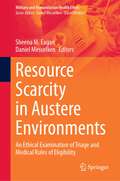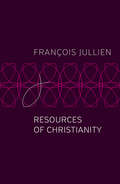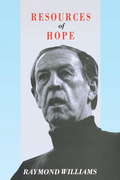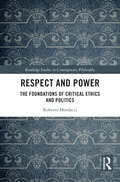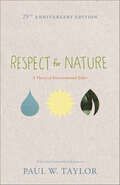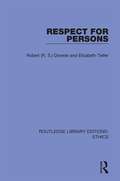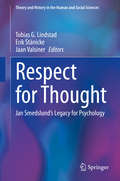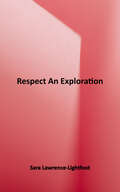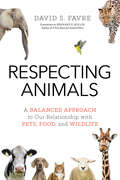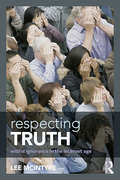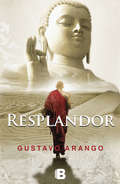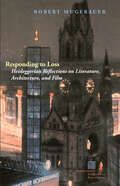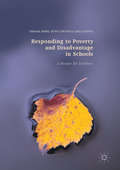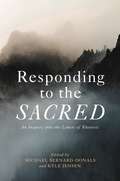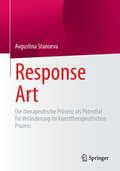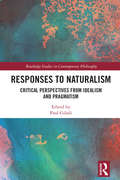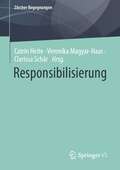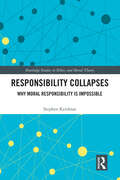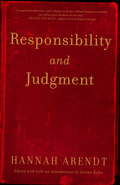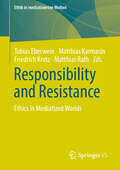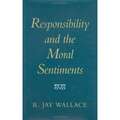- Table View
- List View
Resolving Intergenerational Conflicts: An Approach from Philosophy, Economics, and Experiments (Advances in Japanese Business and Economics #33)
by Toshiaki HiromitsuThis book is an unprecedented consideration of the challenges of what we can do for generations yet to come. Many growing intergenerational conflicts of interest, such as climate change and fiscal sustainability, are the result of the historically new progress of increasing human power, and the resolution of those conflicts demands a new intergenerational ethic. The book offers fresh new ideas for resolving intergenerational conflicts through the exploration of an entirely new field, conceptualized in philosophy, developed in economics, and tested in experiments. In particular, this work develops the theory of intergenerational cooperation based on a new relationship of direct reciprocity between generations. From experimental results, the possibility of intergenerational cooperation through Kantian categorical imperative is shown. The book also examines the effectiveness of inviting representatives of future generations, which are called "imaginary future generations", into the deliberations for current policy decisions. The original Japanese edition of this book was awarded the 66th Nikkei Prize for Excellent Books in Economic Science. The prize was established in 1958 to contribute to the advancement of academics and knowledge in the fields of economics, management, and accounting, as well as to its general dissemination and application.
Resonances of Neo-Confucianism (Palgrave Studies in Comparative East-West Philosophy)
by Margus OttThis book “resonates” the work of Chinese and Western philosophers, developing ontological ideas that are neither purely Chinese nor Western. In so doing, it argues that Deleuzian idea of “resonance” offers a model for a new way of doing comparative philosophy in which the comparison actualizes the virtual and counter-actualizes the actual in both compared traditions. More particularly, Neo-Confucian thinkers Zhang Zai (1020–1077), Zhu Xi (1130–1200), and Wang Yangming (1472–1529) are resonated with Baruch Spinoza (1632–1677), Arthur Schopenhauer (1788–1860), Husserlian phenomenology, and Gilles Deleuze (1925–1995). The three Chinese thinkers represent three distinct currents of Neo-Confucianism: the school of veins (li) of Zhu Xi, the school of energy (qi) of Zhang Zai, the school of mind (xin) of Wang Yangming. The method of resonance is used to discuss the following topics: dichotomy of veins and energy, temporality and subjectivity, self-cultivation, all-embracing energy, dichotomy of primary ability and primary knowledge.
Resounding Events: Adventures of an Academic from the Working Class
by William E. ConnollyWinner, David Easton Award for Political Theory, 2023In Resounding Events, one of the world’s preeminent political theorists reflects on a career as an academic hailing from the working class. From youthful experiences of McCarthyism, to the resurgence of white evangelicalism, to the advent of aspirational fascism and the acceleration of the Anthropocene, Connolly traces a career spent passionately engaged in making a more just, diverse, and equitable world. He surveys the shifting ground upon which politics can be pursued; and he discloses how to be an intellectual in universities that today do not encourage that practice.Far more than a memoir, Resounding Events probes the concerns that have animated Connolly’s work across more than a dozen books by tracing the bumpy imbrications of event, memory and thinking in intellectual life. Connolly experiments with ways to capture various voices that mark a self at any time. An event, as he elaborates it, is what disturbs or inspires thinking as it activates layered sheets of memory. A memory sheet itself assembles recollections, dispositions organized from the past, and vague remains that carry efficacies.Resounding Events shows how resonances between event and memory can help forge new concepts better adjusted to an emergent situation. Addressing tensions between working class experience and norms of the academy, his father’s coma, antiwar protests, the growing disaffection of the white working class, the neoliberalization of the university, climate denialism, and his sister’s experience with workers shifting to Trump, Connolly shows how engaged intellectuals become worthy of the events they encounter.
Resource Scarcity in Austere Environments: An Ethical Examination of Triage and Medical Rules of Eligibility (Military and Humanitarian Health Ethics)
by Daniel Messelken Sheena M. EaganThis book focuses on resource allocation in military and humanitarian medicine during times of scarcity and austerity. It is in these times that health systems bend, break, and even collapse and where resource allocation becomes a paramount concern and directly impacts clinical decision-making. Such times are challenging and this book covers this very important, yet, scarcely researched topic within the field of bioethics. This work brings together experts and practitioners in the fields of military health care, philosophy, ethics, and other disciplines to provide analysis on a variety of related topics ranging from case studies and first-hand experiences to policy and philosophical analysis. It is of great interest to to academics, practitioners, policy makers and students who are looking for analyses and guidance regarding the fair provision of medical care and the use of medical rules of eligibility under adverse conditions.
Resources of Christianity
by François JullienChristianity is bound up with the very idea of the West: we cannot evade it even if we would like to. While many people no longer believe in Christianity, we cannot deny that it has left a deep imprint on Western thought. But how might we develop a philosophy of Christianity that is not a Christian philosophy? How can we take a view that is external to the traditions of apologetics and criticism? For there is a question that concerns us all here: are the coherences of Christianity still useful for thought, and especially for thought about existence? To address this question, François Jullien considers Christianity as constituting a set of resources. Resources are available to all and can be used by those who discover and exploit them; they belong to no one. Christianity offers us resources inasmuch as we can draw some benefit from it, inasmuch as it can be the source of an effect, without our having to believe it or determine its truth in advance. Jullien reads the Gospels, and especially the Gospel of John, as he would read any other text, seeking to account for the text's coherence (rather than its ‘meaning’), seeking to account for its pertinence (rather than its ‘truth’), but without any need to adhere – the exploitation of resources demands no conversion. And in reading the Gospel of John in this way, we discover the fertile veins of a theory of existence. This fresh and erudite reflection on Christianity will be of great value to anyone interested in religion and its relevance today.
Resources of Hope
by Raymond WilliamsCollected essays and talks from one of Britain's great thinkers, ranging across political and cultural theory Raymond Williams possessed unique authority as Britain's foremost cultural theorist and public intellectual. Informed by an unparalleled range of reference and the resources of deep personal experience, his life's work represents a patient, exemplary commitment to the building of a socialist future. This book brings together important early writings including "Culture is Ordinary," "The British Left," "Welsh Culture" and "Why Do I Demonstrate?" with major essays and talks of the last decade. It includes work on such central themes as the nature of a democratic culture, the value of community, Green socialism, the nuclear threat, and the relation between the state and the arts. Here too, collected for the first time, are the important later political essays which undertake a thorough revaluation of the principles fundamental to the idea of socialist democracy, and confirm Williams as a shrewd and imaginative political theorist. In a sober yet constructive assessment of the possibilities for socialist advance, Williams--in the face of much recent intellectual fashion--powerfully reasserts his lifelong commitment to "making hope practical, rather than despair convincing. " This valuable collection confirms Raymond Williams as a thinker of rare versatility and one of the outstanding intellectuals of our century.
Respect and Power: The Foundations of Critical Ethics and Politics (Routledge Studies in Contemporary Philosophy)
by Roberto MordacciThis book presents a historically informed, theoretically systematic, and critically articulated theory of respect that challenges many of the presuppositions of the current debate in ethics and politics. It develops a theory of respect as the rule of power relations, which draws connections between Kant’s critical philosophy and Critical Theory.The concept of respect is the foundation of normative theory. Any human practice is subject to a judgment in terms of respect, and a comprehensive theory is needed to critically assess our individual and social practices. This book elaborates an uncommon understanding of respect through a historical reconstruction of the practices of respect and a theoretical analysis of the limits of current theories of respect. Power is the fundamental force at work in social relations, and respect is the recognition of power with a critical stance that defines how power is to be used and regulated. A close confrontation with Hannah Arendt’s and Michel Foucault’s conceptions of power offers the opportunity to clarify in which sense respect is the rule of power relations. This also helps to overcome the anthropocentric bias inherent in many theories of respect. It is important to recognize that living beings and nature possess power, and that we must acknowledge this and understand the limitations of our power over them.Respect and Power will appeal to researchers and graduate students working in moral and political philosophy, political theory, critical theory, and the social sciences.
Respect for Nature: A Theory of Environmental Ethics (Studies in Moral, Political, and Legal Philosophy #51)
by Paul W. TaylorWhat rational justification is there for conceiving of all living things as possessing inherent worth? In Respect for Nature, Paul Taylor draws on biology, moral philosophy, and environmental science to defend a biocentric environmental ethic in which all life has value. Without making claims for the moral rights of plants and animals, he offers a reasoned alternative to the prevailing anthropocentric view--that the natural environment and its wildlife are valued only as objects for human use or enjoyment. Respect for Nature provides both a full account of the biological conditions for life--human or otherwise--and a comprehensive view of the complex relationship between human beings and the whole of nature. This classic book remains a valuable resource for philosophers, biologists, and environmentalists alike--along with all those who care about the future of life on Earth. A new foreword by Dale Jamieson looks at how the original 1986 edition of Respect for Nature has shaped the study of environmental ethics, and shows why the work remains relevant to debates today.
Respect for Persons: A Philosophical Analysis of the Moral, Political and Religious Idea of the Supreme Worth of the Individual Person
by Elizabeth Telfer Robert (R. DownieOriginally published in 1969, this book provides a sustained examination of the idea of the individual person as of supreme worth in the language of analytical philosophy. An important contribution to debates in moral philosophy, it will be of use to students in the philosophy of religion and education and to those who are interested in the contribution which philosophical analysis can make to the understanding of traditional moral and political ideas.
Respect for Thought: Jan Smedslund’s Legacy for Psychology (Theory and History in the Human and Social Sciences)
by Jaan Valsiner Tobias G. Lindstad Erik StänickeThis book explores and provides an overview of the Norwegian psychologist Jan Smedslund's life work on Psycho-logic. His contributions to science have been radical not only in challenging the empirical foundation of psychology, but also in seeking to develop a viable alternative. This book brings together various reflections on his key contributions from the 1960s to the present day. The volume features three chapters by Jan Smedslund, offering his updated views on psychological science and psychotherapy. It also features contributions from several scholars that critically evaluates his legacy. His seminal ideas are discussed, revised and expanded upon and the questions raised are put in relevant historical and interdisciplinary context. Respect for Thought is a valuable resource for psychological researchers, historians of psychology, cultural psychologists, critical psychologists, theoretical psychologists, clinical psychologists and psychotherapists, social scientists, philosophers of psychology, and philosophers of science.
Respect: An Exploration (A\merloyd Lawrence Book Ser.)
by Sara Lawrence-LightfootIn these many-layered and masterfully written portraits, Sara Lawrence-Lightfoot reaches deep into human experience -- from the drama of birth to the solemn vigil before death -- to find the essence of respect. In her moving vision, relayed through powerfully told stories, respect is not the passive deference offered by a superior but an active force that creates symmetry even in unequal relationships. The reader becomes an eyewitness to the remarkable empowering nature of respect, both given and received -- be it between doctor and patient, teacher and student, photographer and subject, and midwife and laboring mother. They will feel it in the reverent attention paid by a minister to the last moments of life and in the Harvard Law School professor's lively curiosity about his student's extracurricular lives. Through the power of her narrative, Sara Lawrence-Lightfoot ultimately makes the reader an intimate partner in her observations of respect linking these varied and intense relationships. A book to be savored and shared, Respect has the power to transform lives.
Respecting Animals: A Balanced Approach to Our Relationship with Pets, Food, and Wildlife
by David S. FavreA legal scholar and animal-rights expert argues for a practical approach to using animals respectfully.In this fresh approach to the animal rights debate, a legal scholar and expert on the humane treatment of animals argues for a middle ground between the extreme positions that often receive the most public attention. Professor Favre advocates an ethic of respectful use of animals, which finds it acceptable for humans to use animals within limited boundaries. He looks at various communities where humans and animals interact: homes, entertainment, commercial farms, local wildlife, and global wildlife. Balancing the interests of the animal against the interests of the human actor is considered in detail. The author examines the following questions, among others: Is it ethically acceptable to shoot your neighbor's dog for barking hours on end? Is it ethical for a zoo to keep a chimpanzee in an exhibit? Is it ethical to eat the meat of an animal? Finally, he discusses how good ethical outcomes can best be transported into the legal system. The author suggests the creation of a new legal category, living property, which would enhance the status of animals in the legal system. This thoughtful, well-argued, and elegantly written book provides readers with a comprehensive and practical context in which to consider their personal and social relationships with animals.
Respecting Truth: Willful Ignorance in the Internet Age
by Lee McIntyreThroughout history, humans have always indulged in certain irrationalities and held some fairly wrong-headed beliefs. But in his newest book, philosopher Lee McIntyre shows how we've now reached a watershed moment for ignorance in the modern era, due to the volume of misinformation, the speed with which it can be digitally disseminated, and the savvy exploitation of our cognitive weaknesses by those who wish to advance their ideological agendas. In Respecting Truth: Willful Ignorance in the Internet Age, McIntyre issues a call to fight back against this slide into the witless abyss. In the tradition of Galileo, the author champions the importance of using tested scientific methods for arriving at true beliefs, and shows how our future survival is dependent on a more widespread, reasonable world.
Resplandor
by Gustavo ArangoLa historia de un viaje que cambiará tu vida. A finales del siglo cuarto (399 d. C.), el monje chino Fa Hsien emprendió uno de los viajes más asombrosos de que se tenga noticia. Partió de Chang-han y, en compañía de otros monjes, se dirigió a la India en busca de los libros de disciplina del budismo. Los monjes bordearon la región del Tibet, atravesaron el desierto y siguieron hacia el Oeste, hasta lo que hoy son Afganistán y Pakistán. Luego descendieron a la región norte de la India y sur del Himalaya. Allí visitaron los lugares donde mil años atrás había transcurrido la vida de Siddhartha Gautama, el Buda.
Responding to Loss: Heideggerian Reflections on Literature, Architecture, and Film (Perspectives in Continental Philosophy)
by Robert MugerauerMuch recent philosophical work proposes to illuminate dilemmas of human existence with reference to the arts and culture, often to the point of submitting particular works to preconceived formulations. In this examination of three texts that respond to loss, Robert Mugerauer responds with close, detailed readings that seek to clarify the particularity of the intense force such works bring forth. Mugerauer shows how, in the face of what is irrevocably taken away as well as of what continues to be given, the unavoidable task of interpretation is ours alone.Mugerauer examines works in three different forms that powerfully call on us to respond to loss: Cormac McCarthy’s The Crossing, Daniel Libeskind’s Jewish Museum Berlin, and Wim Wenders’s film Wings of Desire. Explicating these difficult but rich works with reference to the thought of Martin Heidegger, Jean-Luc Marion, Hannah Arendt, and Emmanuel Levinas, the author helps us to experience the multiple and diverse ways in which all of us are opened to the saturated phenomena of loss, violence, witnessing, and responsibility.
Responding to Poverty and Disadvantage in Schools
by Carlo Raffo Tamara Bibby Ruth LuptonThis book explores a range of challenges teachers face in dealing with situations of disadvantage, and explores different ways of thinking about these situations. Starting with a variety of incidents written by teachers in schools in disadvantaged settings, the book provides a range of ways of thinking about these - some more psychological, others more sociological - and chapters develop conversations between teachers and academics. These 'conversations' will help teachers reflect more deeply on the contexts in which they work, on what disadvantage means, and how disadvantage manifests in practice. It will also help teachers reflect upon the nature of their work; what it means to be a good and effective teacher; and the particular skills, approaches, relationships and competencies that may need to be developed in differing settings of educational disadvantage. The book explores the tensions between different ways of thinking about education and disadvantage; it will make compelling reading for students and teachers of education, education policy makers, and practising schoolteachers.
Responding to the Sacred: An Inquiry into the Limits of Rhetoric
by Michael Bernard-Donals and Kyle JensenWith language we name and define all things, and by studying our use of language, rhetoricians can provide an account of these things and thus of our lived experience. The concept of the sacred, however, raises the prospect of the existence of phenomena that transcend the human and physical and cannot be expressed fully by language. The sacred thus reveals limitations to rhetoric.Featuring essays by some of the foremost scholars of rhetoric working today, this wide-ranging collection of theoretical and methodological studies takes seriously the possibility of the sacred and the challenge it poses to rhetorical inquiry. The contributors engage with religious rhetorics—Jewish, Jesuit, Buddhist, pagan—as well as rationalist, scientific, and postmodern rhetorics, studying, for example, divination in the Platonic tradition, Thomas Hobbes’s and Walter Benjamin’s accounts of sacred texts, the uncanny algorithms of Big Data, and Hélène Cixous’s sacred passages and passwords. From these studies, new definitions of the sacred emerge—along with new rhetorical practices for engaging with the sacred.This book provides insight into the relation of rhetoric and the sacred, showing the capacity of rhetoric to study the ineffable but also shedding light on the boundaries between them.
Responding to the Sacred: An Inquiry into the Limits of Rhetoric
by Michael Bernard-Donals and Kyle JensenWith language we name and define all things, and by studying our use of language, rhetoricians can provide an account of these things and thus of our lived experience. The concept of the sacred, however, raises the prospect of the existence of phenomena that transcend the human and physical and cannot be expressed fully by language. The sacred thus reveals limitations of rhetoric.Featuring essays by some of the foremost scholars of rhetoric working today, this wide-ranging collection of theoretical and methodological studies takes seriously the possibility of the sacred and the challenge it poses to rhetorical inquiry. The contributors engage with religious rhetorics—Jewish, Jesuit, Buddhist, pagan—as well as rationalist, scientific, and postmodern rhetorics, studying, for example, divination in the Platonic tradition, Thomas Hobbes’s and Walter Benjamin’s accounts of sacred texts, the uncanny algorithms of Big Data, and Hélène Cixous’s sacred passages and passwords. From these studies, new definitions of the sacred emerge—along with new rhetorical practices for engaging with the sacred.This book provides insight into the relation of rhetoric and the sacred, showing the capacity of rhetoric to study the ineffable but also shedding light on the boundaries between them.In addition to the editors, the contributors to this volume include Michelle Ballif, Jean Bessette, Trey Conner, Richard Doyle, David Frank, Daniel M. Gross, Kevin Hamilton, Cynthia Haynes, Steven Mailloux, James R. Martel, Jodie Nicotra, Ned O’Gorman, and Brooke Rollins.
Response Art: Die therapeutische Präsenz als Potential für Veränderung im kunsttherapeutischen Prozess
by Avgustina StanoevaDieses Buch beleuchtet das Thema der künstlerischen Antwort (Response Art) in der Therapie. Die Arbeit vertieft sich im Thema durch Erfahrungen aus dem Einzel- und Gruppensetting basierend auf der Dynamik einer beantwortenden Beziehung (responsive relationship). In dem die Autorin ihre eigene künstlerische Arbeit in der Therapie als Forschungsobjekt betrachtet, veranschaulicht sie die Verwendung von Bildern der Kunsttherapeut*innen, die während und nach der klinischen Arbeit als Antwort entstehen. Mithilfe anschaulicher Beispiele gibt sie einen Überblick über die Entwicklung von Response Art als einen festen Bestandteil der klinischen Routinepraxis der Kunsttherapeut*innen.
Responses to Naturalism: Critical Perspectives from Idealism and Pragmatism (Routledge Studies in Contemporary Philosophy)
by Paul GiladiThis volume offers critical responses to philosophical naturalism from the perspectives of four different yet fundamentally interconnected philosophical traditions: Kantian idealism, Hegelian idealism, British idealism, and American pragmatism. In bringing these rich perspectives into conversation with each other, the book illuminates the distinctive set of metaphilosophical assumptions underpinning each tradition’s conception of the relationship between the human and natural sciences. The individual essays investigate the affinities and the divergences between Kant, Hegel, Collingwood, and the American pragmatists in their responses to philosophical naturalism. The ultimate aim of Responses to Naturalism is to help us understand how human beings can be committed to the idea of scientific progress without renouncing their humanistic explanations of the world. It will appeal to scholars interested in the role idealist and pragmatist perspectives play in contemporary debates about naturalism.
Responsibilisierung (Zürcher Begegnungen)
by Clarissa Schär Veronika Magyar-Haas Catrin HeiteDer Band prüft den Begriff Responsibilisierung aus unterschiedlichen disziplinären Perspektiven auf seine Aktualität, sein analytisches Gewicht und seine theoretischen Bedeutungen und bringt so die Erziehungswissenschaft mit der Soziologie, der Philosophie oder der Geschichtswissenschaft ins Gespräch. Es wird sowohl danach gefragt, welche tragfähigen theoretischen, analytischen und politischen Perspektiven mit einer positiven Bezugnahme auf die Begriffe ‹Verantwortung› und ‹Responsibilisierung› verbunden sind, als auch danach, welche Kritiken angemessen erscheinen.
Responsibility Collapses: Why Moral Responsibility is Impossible (Routledge Studies in Ethics and Moral Theory)
by Stephen KershnarOur worldview assumes that people are morally responsible. Our emotions, beliefs, and values assume that a person is responsible for what she thinks and does, and that this is a good thing. This book argues that this worldview is false. It provides four arguments for this conclusion that build on the free will and responsibility literatures in original and insightful ways: 1. Foundation: No one is responsible because there is no foundation for responsibility. A foundation for responsibility is something for which a person is responsible but not by being responsible for something else. 2. Epistemic Condition: No one is responsible because no one fulfills the epistemic condition necessary for blameworthiness. 3. Internalism: If a person were responsible, then she would be responsible for, and only for, what goes on in her head. Most of the evidence for responsibility says the opposite. 4. Amount: No one is responsible because we cannot make sense of what makes a person more or less praiseworthy (or blameworthy). There is no other book that argues against moral responsibility based on foundationalism, the epistemic condition, and internalism and shows that these arguments cohere. The book’s arguments for internalism and quantifying responsibility are new to the literature. Ultimately, the book’s conclusions undermine our commonsense view of the world and the most common philosophical understanding of God, morality, and relationships. Responsibility Collapses: Why Moral Responsibility Is Impossible is essential reading for scholars and advanced students in philosophy, religious studies, and political science who are interested in debates about agency, free will, and moral responsibility.
Responsibility and Judgment
by Hannah ArendtBest known as the author of The Origins of Totalitarianism, philosopher Hannah Arendt (1906-1975) spent much of her academic and writing career wrestling with questions of morality. This volume presents unpublished writings from the last decade of Arendt's life examining the nature of evil and moral choice and the connection between judgment and responsibility. Kohn provides background information on Arendt's life and ideas in the introduction. Annotation 2004 Book News, Inc., Portland, OR (booknews.com)
Responsibility and Resistance: Ethics in Mediatized Worlds (Ethik in mediatisierten Welten)
by Matthias Rath Matthias Karmasin Friedrich Krotz Tobias EberweinThe volume deals with the normative challenges and the ethical questions imposed by, and through, the developments and changes in everyday life, culture and society in the context of media change. It is thus concerned with the questions of whether and how the central concept of (enlightened) ethics must evolve under these premises – or in other words: what form do ethics take in mediatized societies? In order to address this question and to stimulate and initiate a debate, the authors focus on two concepts: responsibility and resistance. Their contributions try to shed light not only on the empirical shreds of evidence of change in mediatized societies, but also on the normative challenges and ethical possibilities of these developments.
Responsibility and the Moral Sentiments
by R. Jay WallaceWe need to understand what we are doing when we hold people morally responsible, a stance that Wallace connects with a central class of moral sentiments, those of resentment, indignation and guilt. To hold someone responsible, he argues, is to be subject to these reactive emotions in one's dealings with that person. Developing this theme, he offers an interpretation of the reactive emotions and traces their role in our practices of blame and moral sanction.
